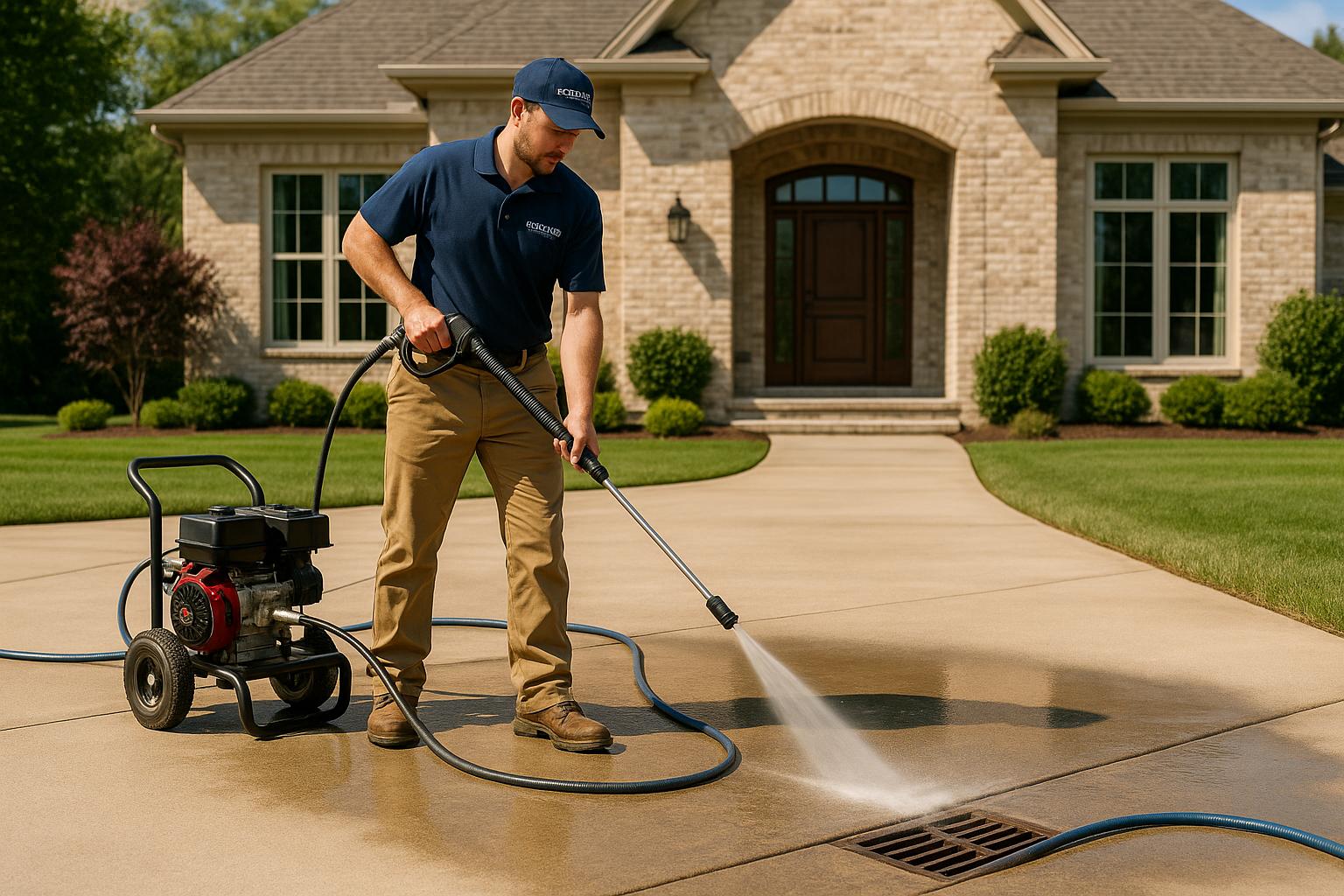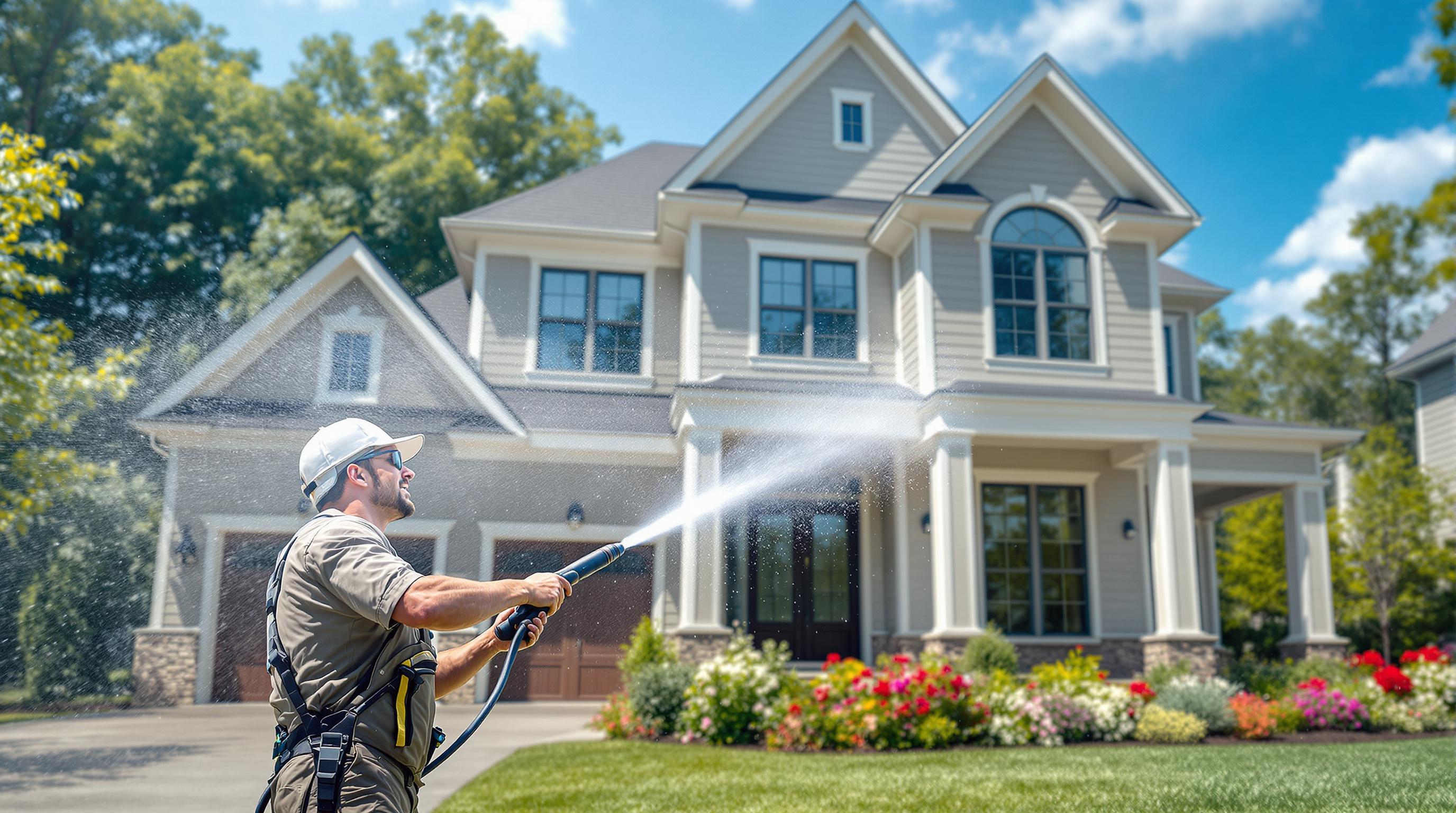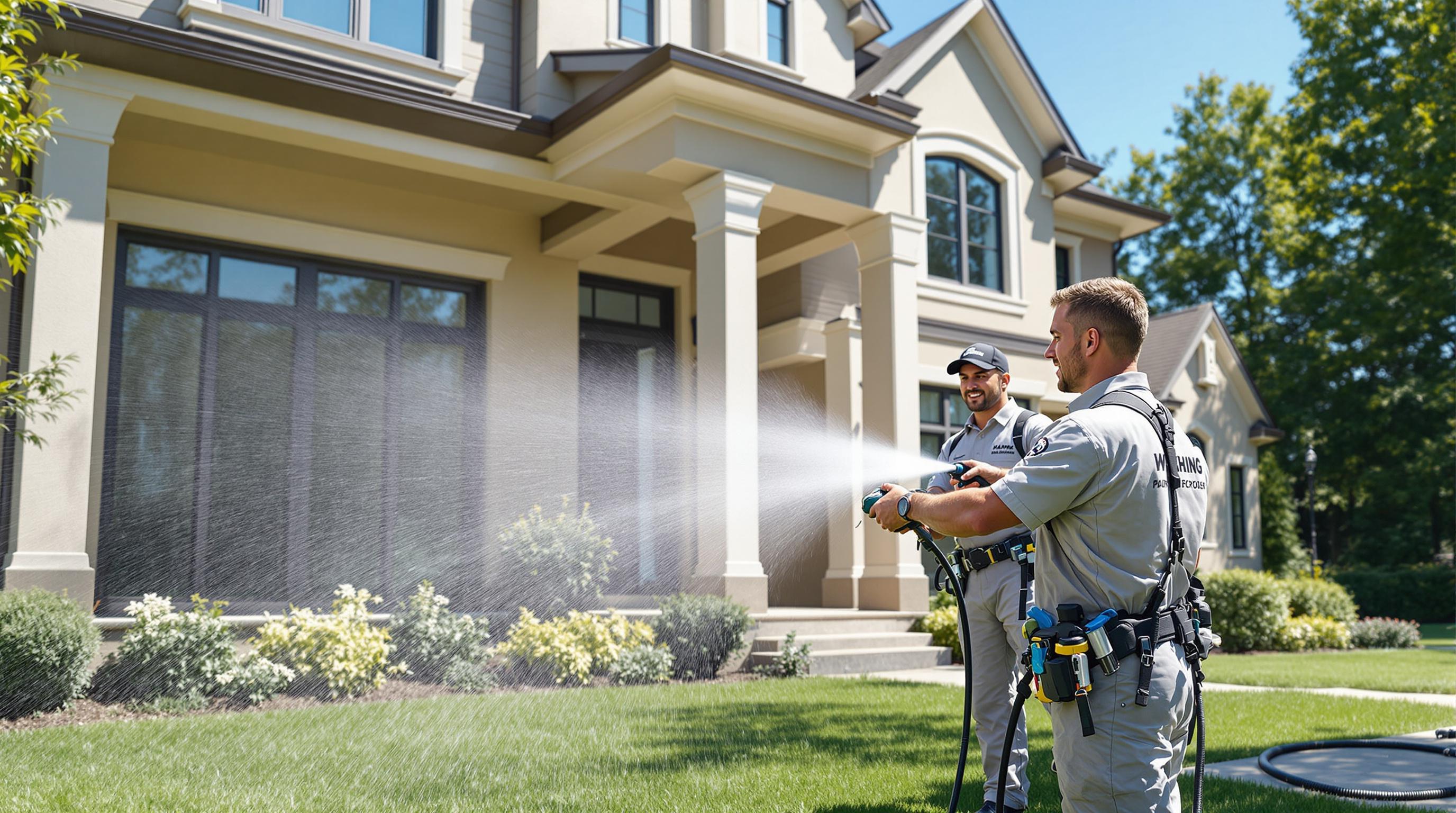Pressure washing costs vary significantly based on the surface type. Here's a quick breakdown:
- Concrete: High-pressure cleaning works best. It’s cost-effective but may increase by 10% for stubborn stains needing special treatments like degreasers.
- Wood: Requires low-pressure soft washing with wood-safe cleaners. Labor and materials increase costs by 20-30% due to the delicate process.
- Brick: Medium pressure and masonry cleaners are used. Costs rise by 15-25% because of the extra time and care needed to avoid damage.
Each surface requires specific tools, techniques, and treatments, which directly impact pricing. To save time and money, ensure your service provider uses the right methods for your surface type.
Pressure Wash Pricing Guide (for maximum profits)
1. Concrete Surfaces
Driveways, patios, and walkways can handle high-pressure cleaning, making it easier to remove tough stains using professional-grade equipment. Stubborn stains like oil, grease, or mold often need specialized treatments, such as degreasers or antimicrobial solutions. These treatments can increase both labor and material expenses.
The team at Pressure Washing Cary NC carefully examines the stains, surface conditions, and safety concerns before providing a quote. They determine the best pressure settings and cleaning products to ensure accurate pricing and avoid any damage.
Wood surfaces, on the other hand, require a softer approach. Learn how this impacts pricing in the next section.
2. Wood Surfaces
When it comes to cleaning wood surfaces like decks, fences, and pergolas, soft washing is the go-to method. This approach combines a low-pressure spray with wood-safe cleaners to prevent damage. While this technique is more expensive, the added cost comes from the use of specialized detergents and the need for skilled technicians.
Several factors can impact the cost of cleaning wood surfaces:
- Wood type and condition: Softer woods or boards that are heavily weathered may require extra care or pre-treatment.
- Cleaning methods and materials: Using specialized cleaning solutions and softer nozzles increases both labor and material costs.
- Size and accessibility: Larger areas or spots that are harder to reach demand more time and effort.
- Stains or biological growth: Issues like deep stains, mold, or algae often call for extra treatment steps.
The soft washing process typically includes an inspection, targeted cleaning of stains or growth, a controlled low-pressure rinse, and an optional sealant or stain application to help protect the wood and extend its lifespan.
At Pressure Washing Cary NC, insured technicians use precision-calibrated equipment and approved cleaning solutions to protect wood surfaces. This approach minimizes damage and helps reduce the need for costly replacements over time.
Next, we'll take a closer look at how cleaning brick surfaces impacts pricing.
sbb-itb-8e2a680
3. Brick Surfaces
Brick surfaces require a bit more attention compared to wood. Cleaning brick effectively involves using medium pressure - between 1,500 and 2,000 PSI - and a 25° nozzle. The nozzle should be held 12–18 inches away from the surface to clean the pores and mortar without causing damage. Before starting, technicians treat stains with masonry detergent, followed by a careful rinse while keeping the right angle and distance.
This method takes extra time - about 15–25% more labor - and requires specialized cleaning solutions, which increases the cost of cleaning brick surfaces. Maintaining the correct spray angle and consistent distance is crucial to ensure the brick is thoroughly cleaned without harming the masonry.
At Pressure Washing Cary NC, the team knows how to handle these specific requirements. They strike the right balance between cleaning effectively and protecting the surface. These factors play a major role in determining brick-cleaning costs, which will be discussed further in the next section.
Cost and Care Comparison
The cost and care for pressure washing depend on the type of surface being cleaned. Here's a breakdown of common materials:
- Concrete: Requires high pressure and basic detergents, making it less labor-intensive. Expect an additional 10% charge for treatments targeting heavy stains.
- Wood: Needs low pressure, wood-safe cleaners, and precise techniques. This increases labor and material costs by about 20-30%.
- Brick: Calls for medium pressure, specialized masonry cleaners, and careful handling of the nozzle. Labor costs typically rise by 15-25%.
Understanding these factors helps property owners estimate costs and maintain their surfaces effectively. Use this information to select the service plan that best fits your needs.
Summary and Recommendations
Each surface type requires specific techniques and tools: concrete can handle high pressure and degreasers for oil and mold; wood needs gentle pressure and wood-safe cleaners; and brick requires medium pressure (1,500–2,000 PSI), masonry cleaners, and precise nozzle use.
Here’s how to pick the right service:
- Request detailed quotes: Look for itemized estimates that clearly outline costs based on your surface type.
- Check credentials: Make sure the provider has proper insurance and proven experience with your specific material.
- Ask about cleaning methods: Confirm they’ll use the correct pressure settings and cleaning solutions for your surface.
For reliable results, go with insured professionals who know their stuff. Pressure Washing Cary NC offers free, no-obligation quotes to help safeguard both your surfaces and your wallet.


